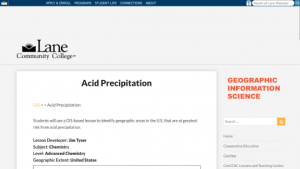
In this lesson from the MAPS GIS program at Lane Community College, acid precipitation will be defined. At different points in the lesson students will write balanced reactions for the formation acid precipitation from atmospheric sulfur and nitrogen oxides and the neutralization of acids by limestone. Students will determine which states are most at risk from acid precipitation and assess how that risk has changed from 1996 to 2006. Sources of atmospheric sulfur (burning of high-sulfur coal) and nitrogen oxides (automobile exhaust) and the buffering effect of limestone soils and its mitigating effect on acid precipitation will be discussed. Students will correlate these areas with sulfur and nitrogen oxide production, population, composition of coal fields, and soil composition. This resource includes both a teaching guide and student worksheets.

Comments